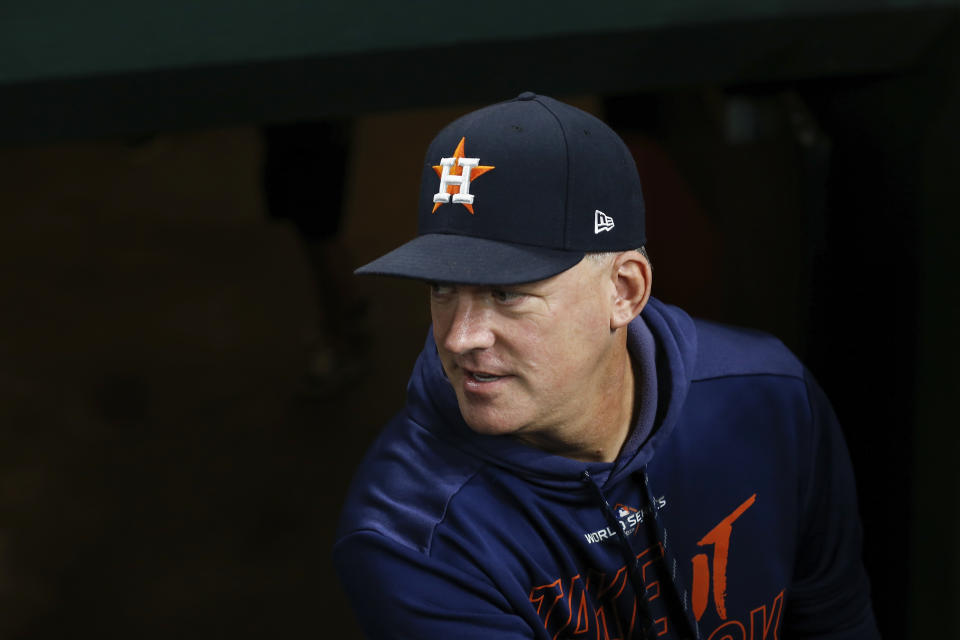In demand despite the Astros sign-stealing scandal, A.J. Hinch is eager to try again with Tigers
Not three full days since he’d counted down the final World Series outs, those listless last minutes on a detention clock, A.J. Hinch sat in a pinstriped suit with a pale pocket square and became manager of the Detroit Tigers.
In his time away from the game, he’d turned 46, spent some weeks at a lake cabin in Michigan, contracted and then recovered from COVID-19, tended to his daughters, watched a lot of baseball and tried to remember the man he once thought of himself as. Then he went about trying to become that guy again.
“I had a lot of time,” he said, “to do all of that.”
The game resides where curiosity meets hostility, and so it seeks value in countless places, most measured in the breadth of a passing idea. On a spreadsheet’s column. In a scout’s peripheral vision. On a rutty diamond half-swallowed by a batey at the end of miles of dirt road. In degrees of launch angle and spin axis and a pitcher’s flared glove and at an imaginary impediment after twice through the lineup. In hidden corners and dark schemes and, sometimes, at the margins of one’s own conscience.
So why not in the guy who’d spent most of the past year face down in the mud?
“It’s been a large topic in my life, as I’ve reflected back and learned to grow and ultimately to decompress from something that was very wrong,” Hinch said. “As I told [owner Chris] Ilitch and Al [Avila, general manager] both, that’s part of my story. That’s not the Tigers’ story. And I understand the question and I understand how wrong it was. And I’m sorry for that. I’ve said that before. I’ll say it again. I’ll continue to say it. I’ll never forget the feeling that I’ve had throughout the past year as I’ve navigated through this with my family.”
The players, his new players, will hear from him next, he said.
“Absolutely those are tough conversations,” he said. “And I will have them one by one. And I will have them as a team. … I’m sorry that they’re going to have to deal with it and that we’re going to have to talk about it. But that is our reality, because wrong is wrong. And it was very wrong. And I’ll make sure that everybody knows that I feel responsible because I was the manager and it was on my watch and I’ll never forget it.”
The Tigers have spent six years in irrelevance, most of those deep in the shadow of Hinch’s Astros. They have not won a World Series in nearly four decades. An organizational rebuild cost them 114 losses in 2019 and yet another last-place finish in 2020. They need better players. They need promising players to grow into their bodies, their fastballs and their potential. They need time and acuity and good fortune, all the stuff that stands between playing the game and winning the game.

For now they have A.J. Hinch, spit from the cheating scandal that forever soiled a franchise, its people and its achievements. If there were a question as to how long before some of them would be invited back, no matter how regretful, the answer came Tuesday night: About half an hour.
Hinch’s phone rang 30 minutes after Julio Urias struck out Willy Adames, so 30 minutes after Hinch’s season-long suspension had expired. The caller was Al Avila, general manager of the Tigers.
“Hello?” Hinch said.
“A.J., it’s Al, and I’d like you to get on a plane tomorrow.”
“Absolutely,” Hinch said. “Book it, and I’ll get to Detroit as soon as possible.”
He was in Detroit by Wednesday. He had an offer by Thursday. He was in a pinstriped suit with a pale pocket square by Friday.
He was back in a game he couldn’t be sure would ever have him, and couldn’t know the newest market inefficiency might be distressed managers and rebuilt men.
He will always be the manager who was in charge that time when baseball needed someone who would take up for it, who would put the game before himself and who would defend it first and last. He was not willful enough then. Only he would know why.
“One mistake doesn’t determine a man,” Avila decided. “Who he is.”
He is the guy who messed up. He is the guy who should have been better and had no reason not to be. He is the guy who should have taken a bat to a third TV, then a fourth, and a fifth, until Best Buy ran out of TVs.
He also is the guy standing before you, sorry. Who’d like another chance. Who would start over at 46 and pile good days upon good days, good decisions upon good decisions, until those are the more accurate reflection of himself. It is a long process that does not end because one team decides he is worth the risk. Really, that’s where it begins again, as the man he once thought of himself as.
“I always knew that I wanted to get back into baseball,” he said. “It was a matter of, I think, the game and the people in the game will tell you where that’s going to be, if it’s going to be anywhere. I had a lot of things to deal with at that point and the last thing I was worried about was myself or my career trajectory or what it was going to lead to. I had a lot of time to reflect and grow on it.
“Wherever that led, whatever job title that was going to be, was going to be determined much, much later than the day I was packing up my office and going home.”
More from Yahoo Sports:



